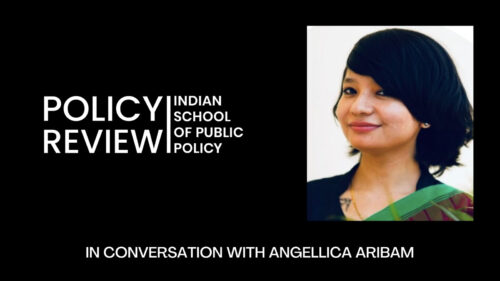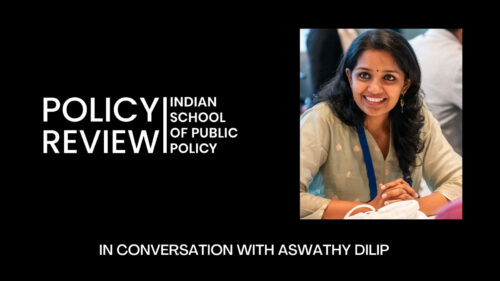Angellica Aribam is a political activist working on issues of gender, race, and the democratisation of politics. She was named one of Forbes India’s “30 Under 30” in 2017 for her work on policy and politics. In 2012, she became the first student from the marginalised northeastern region of India to be elected to the… Continue reading In Conversation with Angellica Aribam
Category: Policy Hub
Explore Policy Hub at ISPP, where India’s top minds converge to drive impactful public policy. Stay informed on research, events, and policy insights
In Conversation with Angellica Aribam

The Potential of Artificial Intelligence in Tackling India’s Healthcare Challenge

India’s healthcare system has been plagued by multiple issues for several decades. A lack of robust healthcare infrastructure, supply-demand inefficiencies, and poor healthcare delivery mechanisms are known to be common across broad swathes of the system. The picture has been starker since the arrival of Covid-19. Questions around quality, affordability and accessibility have become even… Continue reading The Potential of Artificial Intelligence in Tackling India’s Healthcare Challenge
Health and Wellness Centres: Role in Pandemic Preparedness and Response

Abstract A Community-centered primary healthcare system, through a network of Health Wellness Centres (HWCs)1, may be equipped to manage large–scale epidemic outbreaks in Indian rural districts. HWCs, under the theme of comprehensive primary healthcare provision, have already been tasked with Non-Communicable Diseases (NCDs) screening, treatment initiation and follow-up, and awareness of associated risk factors through… Continue reading Health and Wellness Centres: Role in Pandemic Preparedness and Response
In Conversation with Utkarsh Roy, Rahul Raina and Naman Gupta

Mr Utkarsh Roy is one of the co-founders of Introbot AI, a WhatsApp-based artificial intelligence software that helps people find verified covid resources in real-time. He founded this software alongside Mr. Divyaansh Anuj. Mr Roy did his MSc in Computer Science from the University of Toronto and was the co-founder and CEO of OhWow, a… Continue reading In Conversation with Utkarsh Roy, Rahul Raina and Naman Gupta
In Conversation with Aswathy Dilip

Aswathy Dilip is a Senior Programme Manager leading the Complete Streets strategy, policy, and projects work for the ITDP India Programme. With support from her smart and enthusiastic team, she works with the National, State and City governments, providing them technical assistance on sustainable and equitable urban mobility. Her most exciting work includes transforming congested… Continue reading In Conversation with Aswathy Dilip
Mental health in times of increasing economic inequality

Abstract India’s population stands at 1.38 billion. It is the second-most populated country after China. In this highly populated country, suicide is the leading cause of death among young adults aged 15-24.1 Reasons for suicide are varied- failing in an exam, women facing dowry demands from in-laws, acute poverty, drug abuse, and unemployment, etc. The various… Continue reading Mental health in times of increasing economic inequality
In Conversation with Jessica Seddon
Jessica Seddon is the Global Lead, Air Quality at World Resources Institute and Visiting Fellow, Chadha Center on Global India and Princeton University. Her work and leadership focus on developing and implementing social innovations to respond to environmental change. Recorded online in May as a part of our fourth issue “Ensuring a Sustainable Future”, Jessica… Continue reading In Conversation with Jessica Seddon
The Steel-Cage: Need to reform the UPSC Civil Services Examination

Each year in India, an average of 4 lakh candidates appear for the Civil Services Examination (CSE) conducted by the Union Public Service Commission (UPSC). The notification for CSE 2021 has already been released by the UPSC, and the approximate number of vacancies is 712, a reduction from 796 in 2020 and 896 in 2019.… Continue reading The Steel-Cage: Need to reform the UPSC Civil Services Examination
Sustainable deployment of solar water pumps: A case study of Rewari, Haryana

Introduction Agriculture is the mainstay sector of India’s economy and uses 60% to 90% of the available water, depending on climate and economic development of the area2. With increasing pressure on agricultural land and water resources it is estimated that to satisfy food demand in 2050, the world’s agricultural production must increase by 70% and… Continue reading Sustainable deployment of solar water pumps: A case study of Rewari, Haryana
Coastal Displacement in the Indian Subcontinent

The anthropogenic forcing of greenhouse gases has turned out to be a dominant force propelling sea level rise. Sea levels in the 20th century have been rising at an average rate of 0.06m per decade.¹ The Indian subcontinent is highly vulnerable to threats arising from sea level rise given its demography. The country has a… Continue reading Coastal Displacement in the Indian Subcontinent


